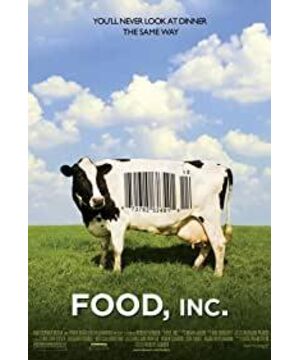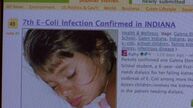1. The industrialization of food manufacturing is not due to the rise of the fast food industry, it is the inevitable development of human society and economy.
2. Industrialization has improved the efficiency of food production without negatively affecting quality. Because the nutrients needed by human beings are in six categories: protein, carbohydrate, fat, vitamins, trace elements and cellulose. You eat industrially produced food and so-called organic food, there is essentially no difference. Of course, for animals, the industrialized production model is indeed very inhumane, but this is another problem.
3. Food safety includes many aspects, and monitoring of production links is just one of them. Aspects that are even more ignored by the general public, such as personal dietary preferences and food handling, are not discussed in the film, which is obviously very biased. In terms of dietary preferences, for example, the taste preference evolved by humans is to like fat and sugars. Therefore, fast food companies have developed high-calorie products to satisfy the tastes of the general public. In pursuit of healthier foods, fast food companies will also develop such products. In terms of food handling, because there are common risks of salmonella and E. coli in raw food, if ordinary people don't pay much attention, such as eating raw food, eating half-baked food, or eating food that is not heated enough, they are more likely to be infected. In addition, when handling food, if cooked food is contaminated by raw food, such as cutting the cooked food without washing the raw meat and lettuce after the knife is cut, or directly touching other foods or dishes after touching the egg shell without washing your hands thoroughly, it will cause infection. Germs. To put it bluntly, the mother in the film claimed to have lost her son because of a problematic meat product from a certain company. In fact, this may also be caused by a problem with her own food handling. In other words, as long as it is raw food, there is a risk of being contaminated by pathogens. The way to avoid this risk is to thoroughly disinfect, clean or heat it before eating.
4. The so-called organic food is generally more unhealthy, because the production process is more susceptible to infections such as bacteria and fungi. These bacteria come from feces as the main fertilizer, wrong anti-chemical disinfection methods, wrong anti-genetic seeds, wrong anti-modern storage methods, etc. Proponents of so-called organic food often lack knowledge of hygiene, nutrition, and toxicology and pathology, and prefer to eat raw food, so they are more prone to the food handling problems mentioned in 3.
5. Misunderstanding of genetically modified food. In essence, natural evolution itself is in the process of "transgenic", and it is precisely because of this process that the human species has evolved.
Retroviruses in nature always transfer genes across species, no matter in the deepest seabed or in the body of birds in the sky, plus the genetic mutation of the germ cells themselves often occurs, so you should not be afraid of genes being transferred. But the most important thing is that eating food will never cause gene transfer. This is because DNA will enter the blood after being broken down; even if the DNA carrying a complete gene fragment enters the blood, it will not easily enter the cell; even if it enters a cell , It is not easy to infect other cells including germ cells; even if the germ cells are infected, they do not necessarily retain reproductive ability; even if the gene is preferentially transferred to the newborn, it is not necessarily a bad thing. Since humans eat so many complex foods in the natural world and have eaten them for so long without major problems, then eating genetically modified foods that have been safety-tested will not be a problem, because genetically modified crops have more controllable ingredients, unlike natural ones. Or artificial hybridization or reverse transcription process allows a large number of genes to be transferred uncontrollably.
6. The lobbying system and policies are introduced. The U.S. political system allows all parties to speak out. Therefore, large companies with strong funds have stronger lobbying capabilities than ordinary farmers, but farmers who dissent can find industry associations or the media, other organizations, or individuals, such as documentary directors, to publish their own opinions. Opinions and making your own demands can all be discussed and gamed openly, just like the film we saw. Only after all of this has been fully discussed and gamed by the scientific community, industry, and the general public, can the voting be conducted, and the relevant policies will finally be promulgated. Fundamentally speaking, the content of science and technology can not be changed by voting, and you are not afraid that you will go to the court to sue or vote. For example, the anti-evolutionist creationists in the United States attempted to teach creationism in schools, and California, etc. Haven't all the local votes on anti-genes been lost to science? So we are indeed a scientific age today.
In short, the ultimate solution to this food problem is to first popularize a scientific diet, that is, to popularize nutrition, pathology, toxicology, and more basic scientific knowledge, and secondly, to improve the unfairness that still exists at the institutional level. Place. Only by changing unscientific concepts and correcting prejudices and prejudices can the problem be solved more fundamentally. In this sense, this documentary is really misleading the public.
View more about Food, Inc. reviews











